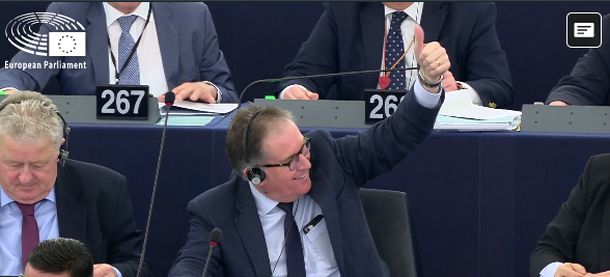
A Danish journalist was expelled from Morocco after having published a story with comments from the Danish Government and former MINURSO chief.
The programme included interviews with:
Jorgen Christensen, fisherman
Stephen Zunes, Professor, University of San Francisco
Kurt Mosgaard, Major General, Armed Forces
Jacob Mundy, PhD, University of Exeter
Khadad Emhamed, UN spokesman for the Saharawi refugees
Buhobeini Yahia, head of the Red Cross in the Saharawi refugee camp
Fadel Mokhtar, senior consultant at the hospital in a refugee camp
Amama Abdelhadi, refugee
Mads Ovlisen, chairman of the Danish Government’s Council on Corporate Social Responsibility
Ole Poulsen, Head of Unit, Danish Ministry of Food, Agriculture and Fisheries
Henrik Hoegh, Danish Minister for Food, Agriculture and Fisheries
On 25th November 2010, Danish national radio channel, P1, aired a documentary about the EU's illegal fisheries in Western Sahara. The 1 hour programme can be heard here (in Danish). Below, you find the article that Danish Radio wrote on their webpages.
The radio programme apparently sparked discontent with the Moroccan government. Few days after the programme was aired, the Danish journalist behind the documentary was expelled from Morocco.
Bloody consequences of European fisheries in Africa
http://www.dr.dk/P1/P1Dokumentar/Udsendelser/2010/11/25105444.htm
(Unofficial translation from Danish by Western Sahara Resource Watch)
P1 Documentary 25th November 2010
CONFLICT-FISH One of the biggest EU fisheries agreements may be contrary to international law. It finds several experts across P1 Documentary. Ministry of Food, Agriculture and Fisheries recognizes that the prerequisites that would make the agreement legally are not met.
It concerns a contract for over a billion dollars, which the EU signed with Morocco four years ago and which is currently under renewal in the EU. The agreement allows European fishermen rights to fish off the occupied country Western Sahara. Meanwhile, live large parts of the original population of starvation in refugee camps far from their old fishing spots.
QUOTES FROM THE DOCUMENTARY
“There must off course be documentation from experts on international law, and from the UN, that the content of the agreement be respected, and that parts of the proceeds go to the population of Western Sahara, and that the international law be respected."
“If no proofs are given on how the proceeds have been used, my recommendation is that we vote against an agreement. We are a part of the EU, and if we are to support this, it is important that international law is respected.”
Henrik Hoegh, Danish Minister for Food, Agriculture and Fisheries
"Off course it is very problematic. We are very unhappy with it".
Ole Poulsen, Head of Unit, Danish Ministry of Food, Agriculture and Fisheries, regarding Morocco's lack of ability to present documentation that the original population of Western Sahara has been benefiting from the agreement.
"Can it in any way be ethically correct to pay an occupying power for natural resources from an occupied country?"
"The EU is a coalition of countries, and should have a real commitment that when they enter into an agreement in respect of the human rights. When the EU in this case has paid 144 million Euros to Morocco for fishing rights offshore Western Sahara, it is imperative that it must be followed up with a guarantee that it is to the benefit of the original population and that the proceeds end up in the right pockets."
How impressed are you with the EU’s work?
"Very little. […] The Parliament explicitly says something radically new must happen if it is to be renewed. […] I mean that if it is not crystal clear documentation that Morocco has done anything to protect the rights of the original population, including to help arranging the difficult referendum on sovereignty in the territory, the EU and Denmark must be incredibly sceptical to support such a project.”
Mads Ovlisen, chairman of the Danish Government’s Council on Corporate Social ResponsibilityIt's not something that worries a Danish fisherman from Skagen, which has seen a good business sense to sail his trawler to the occupied African waters.
- As long as it does not bother my fishing, so I am not so high up in it, says Joergen Christensen P1 Documentary.
Illegal Agreement
It is in direct contravention of international law dealing with natural resources from an occupied territory. It reaffirms America's leading researcher in the field, Professor Stephen Zunes from the University of San Francisco:
- Geneva Convention is very clear on this area: to make money on natural resources from non-self governing territory under occupation is theft.
But the problem, the EU and Morocco solved by typing into the one billion contract to a portion of that money will come Sahrawi indigenous population. Here, four years after conclusion, there is nothing to suggest that this has happened.
It acknowledges the Danish official who has advised the government on the agreement, lawyer and head of the Ministry of Food, Agriculture and Fisheries, Ole Poulsen:
- We have not got concrete answers on how it comes to the local population to benefit, says Ole Poulsen P1 Documentary and stresses that it is something that the Danish Government takes very seriously.
It should not come as a surprise to European politicians that Morocco is not ready to share the European fish-billion, says Stephen Zunes.
- To fish off Western Sahara is definitely helping to prolong the occupation, since it helps to make it very expensive obsession economically viable, "says Steven Zunes from the University of San Francisco, which for years has followed the conflict closely.
Danish UN chief warns of agreement
Also the Danish Maj. Gen. Kurt Mosgaard, urges politicians to think carefully before they renew the agreement. He is responsible for the Danish Defence tasks throughout Africa and was previously the head of UN efforts in Western Sahara.
- This is something the EU and Denmark should consider carefully. For the UN has some opinions on whether you should take resources out of an area whose status has not fallen into place yet, as Western Sahara. One should not the wrong option because it can help to influence the development of the conflict, said Kurt Mosgaard, which today is responsible for the Danish Defence tasks throughout Africa.
Many warnings from the UN
Also Khadad Emhamed, spokesman for Western Sahara refugees in the UN begs the European fisheries ministers to stop it indirect support for the brutal occupation and refuse to renew the agreement, which expires after the turn.
- It's illegal, it is immoral and unacceptable. It prolongs the occupation. The fish comes out of such an agreement here, are dirty fish with Saharawi blood,"said Khadad Emhamed.
Moroccan occupation of Western Sahara is known illegal by the international tribunal in The Hague, and Amnesty International and Human Rights Watch reports of repeated serious violations of human rights.
Here is the EU Council's legal advice on fishing in occupied waters
Hans Corell criticizes EU fisheries in Western Sahara
The former Legal Counsel to the UN Security Counsel, Mr. Hans Corell, comments on the EU's fisheries activities in Western Sahara.
EU Court reaffirms position on Western Sahara
Polisario has a case, but it should be pursued when the time is right, Court implies.
European Parliament disregards Court and adopts Morocco fish deal
Notwithstanding four consecutive rulings of the EU's highest Court calling such a practice illegal, the European Parliament has just now voted in favour of the EU-Morocco Fisheries Agreement that will be applied to the waters of occupied Western Sahara.


